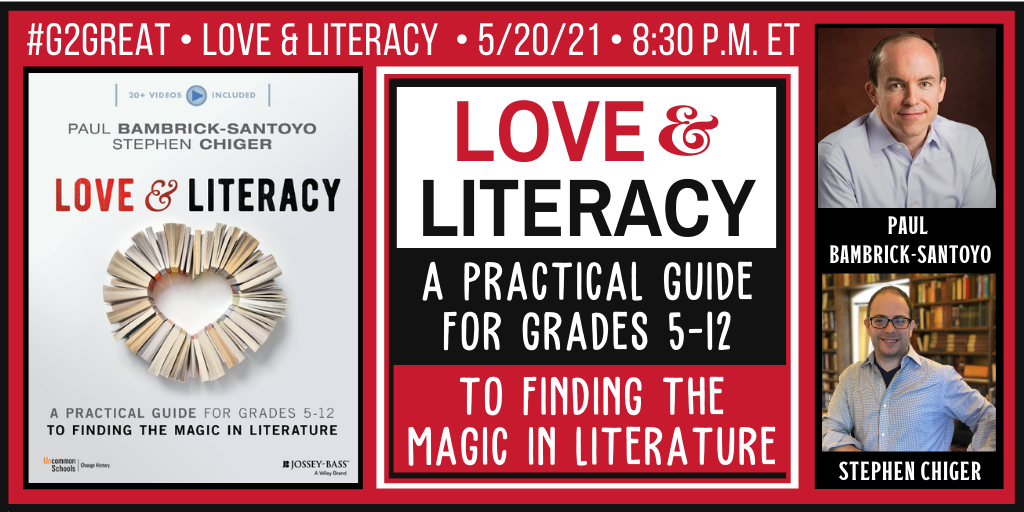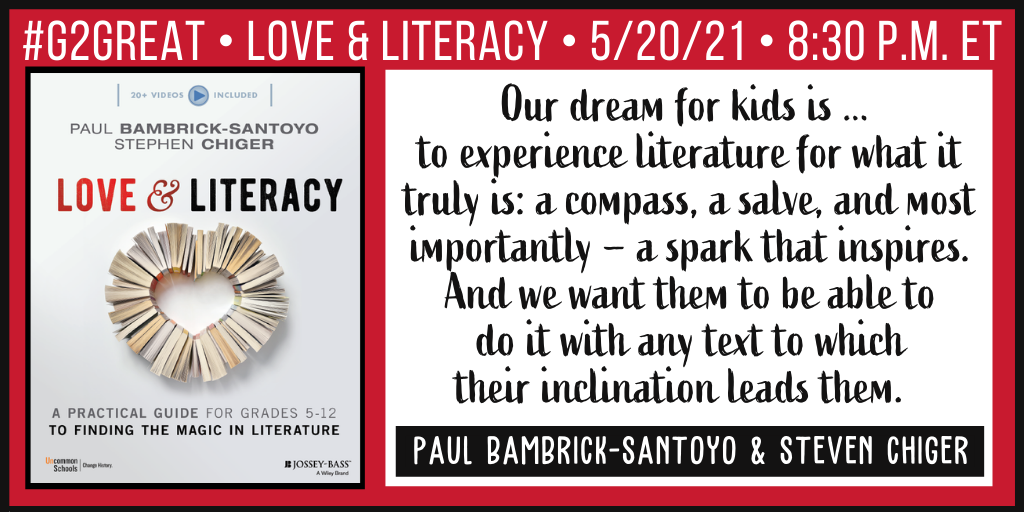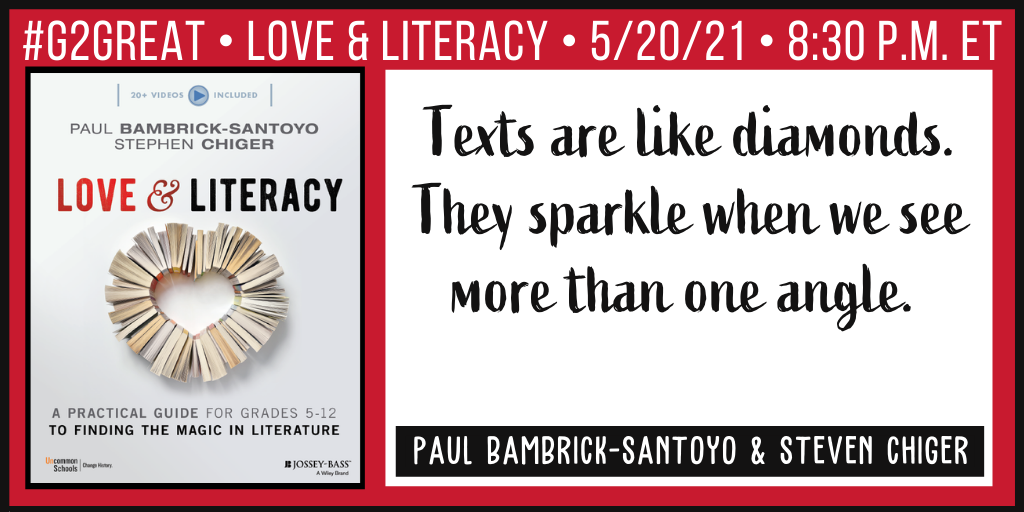by Jenn Hayhurst

On May 20, 2021 Stephen Chiger joined #G2Great to lead a joyful discussion about his and Paul Bambrick-Santoyo’s book, Love & Literacy A Practical Guide For Grades 5-12 to Finding The Magic In Literature. My first thought about their book was, what a beautiful title. Any time the words: love, literacy, and magic come together, I know it is a place I want to be. Stephen did not disappoint. The chat was filled to the brim of good ideas and positivity, all of which was inspired by his brilliant book. We asked Stephen: “What motivated you to write this book? What impact did you hope that it would have in the professional world?”
Ultimately, we wrote this book because we fell in love with the idea of a better world, one where all of our children receive an engaging, equitable education. Paul and I are fortunate to have worked at Uncommon Schools for a combined 3 decades, and in that time we have learned from some of the most tenacious, focused, and caring educators out there. This book is part reportorial in nature – we spend time showing and then analyzing what successful teachers do so that all of us – whether we’re new to the field or seasoned instructors – can make these moves our own.
Above all, I hope this book adds research-based clarity and insight for ELA teachers and coaches. We’ve filled the book with videos, printables, discussion guides, and other resources to help educators bring these ideas to life in their rooms. And in every section, we always spend time demonstrating examples of the approaches we advocate, keeping the book as practical as we can make it!
Specifically, I’d love it if this book can disrupt the binary that educators have to choose between instruction kids love and instruction that challenges them. In our experience, these both go hand in hand. As we quote from one of my mentors: “kids love what they know how to do.”
Stephen Chiger
Stephen has captured our imaginations because if you teach then you know that so much important learning happens through story. Stephen and Paul have given us a resource that will help us craft instruction that is both appealing and relevant to all our students.

Maximizing Student Voice
If we want to develop student voice then we need to give them access to an audience. Giving students time for self-expression and critical thinking shows them that their voices matter. We are all in to know what they have to share, and now they are part of a larger community – a community built on a culture of literacy that is deeply invested in them and what what they have to say:
Instructional gems such as giving students time to be thoughtful and write their responses first prior to turn and talk ensures that all students have the opportunity to cultivate their voice When teachers minimize the role of “teacher voice” in learning we amplify “student voice”. In doing so, we gain invaluable formative data that helps us to know not only what students may need in an academic sense but how they see themselves in the world. The classroom community learns how to appreciate new and different perspectives that encourage flexible thinking.
A Free Exchange of Ideas
We asked Stephen: What are your BIG takeaways from your book that you hope teachers will embrace in their teaching practices?
We think teachers will find new variations on many things they may have already been wondering about or implementing. Specifically, we investigate four big questions that middle- and high-school literacy teachers might have (and that we’ve had!):
· What’s our dream for kids? – What does the curriculum need to reflect and do to serve all children well? How can teachers go about building or revising the curriculum they have?
· What will I see when students “get it”? – How can we break down or make visible reading comprehension and analysis? If students are stuck on a challenging text, what can we do?
· What will I hear when students “get it”? – What does it take to facilitate equitable, student-centered discourse that doesn’t sacrifice our ambitious goals as teachers?
· How do I begin? — What does it take to build a culture where students love reading and develop a sense of self in the humanities? And how can educators project plan to make that – and all the ideas in the book – come to life in our classrooms?
Stephen Chiger
There is a common theme of empowerment for all in Stephen’s answers. Teachers have the power of impact on their side to make a difference for our students. The tweets that follow continue to show ways we can elevate our students’ thinking through dynamic instruction:
When teachers pay attention not only to what students say but how they say it, they are showing them that their ideas have value. Giving students feedback using an asset lens shows students that they are not only seen but appreciated by their teachers. All of these instructional moves knit together to make the classroom a safe place where they can continue to grow: intellectually, socially, and emotionally.

Just as a diamond has its foil, students have their teachers. Stephen and Paul have reminded us that we are here to make our students dazzle and light up the room. We are here to elevate their voices and celebrate their ideas. We asked Stephen: What is a message from the heart you would like for every teacher to keep in mind?
As an English teacher, you know that the path you’ve chosen won’t always be easy. You’ve seen your way through enough bleary-eyed, late-night grading sessions to understand what Robert Hayden called “love’s austere and lonely offices.”
Loving literacy means loving our vast, luminous world, and teaching literacy means sharing that love with others.
Being an English teacher means you are called to love. And when that call comes, you answer.
Paul Bambrick Santoyo & Stephen Chiger
We want to thank Stephen and Paul for writing an important book. Love & Literacy A Practical Guide For Grades 5-12 To Finding The Magic In Literature not only informs best practice but it also inspires us to do the work. It holds true to a value system that honors students completely. If you would like to learn more, and we hope you do, please follow these links:
- To learn more about the book: http://stevechiger.com/love-literacy/
- Stephen’s Blog: https://stevechiger.com/blog/
- Until I Write it Down, Educational Leadership, February 2017: http://www.ascd.org/publications/educational-leadership/feb17/vol74/num05/Until-I-Write-It-Down.aspx